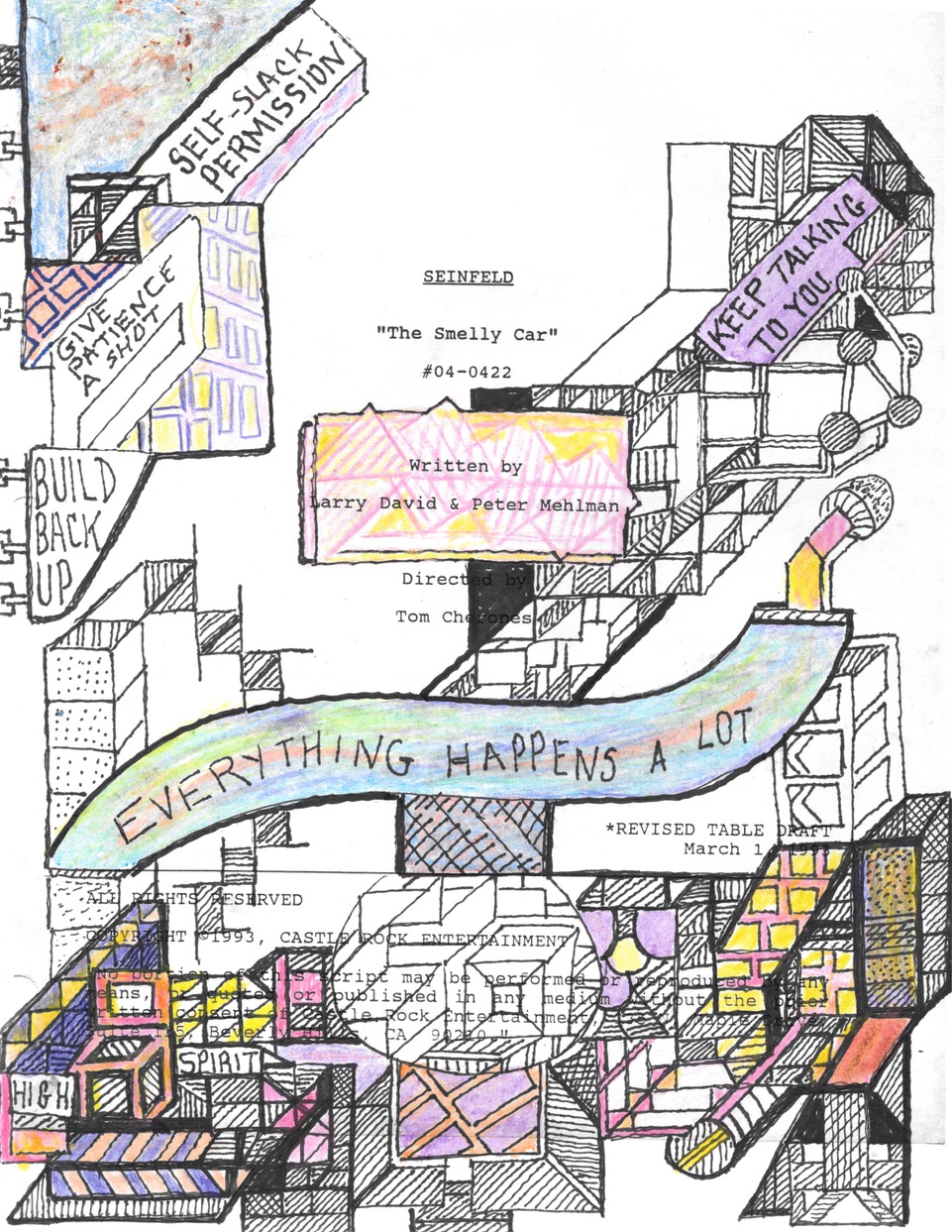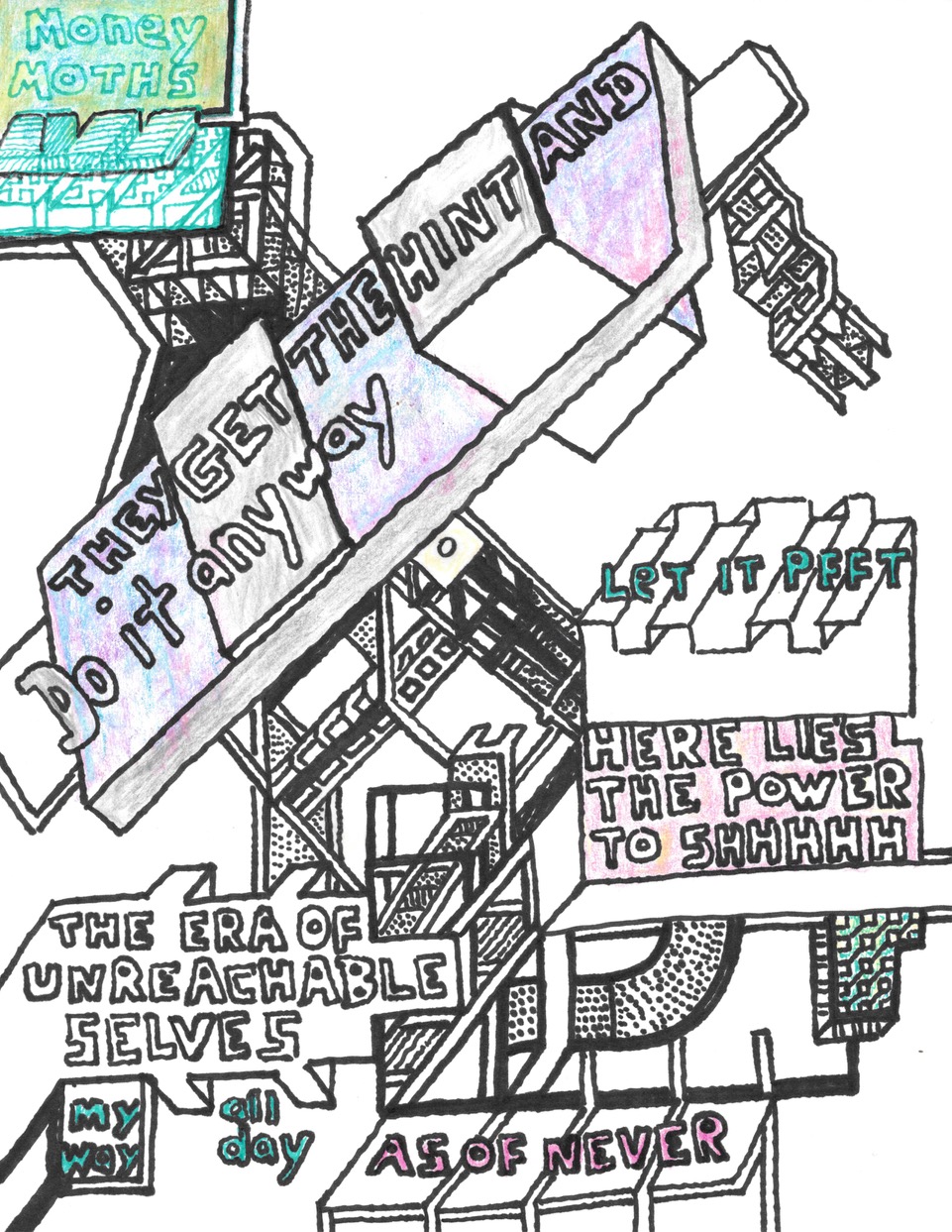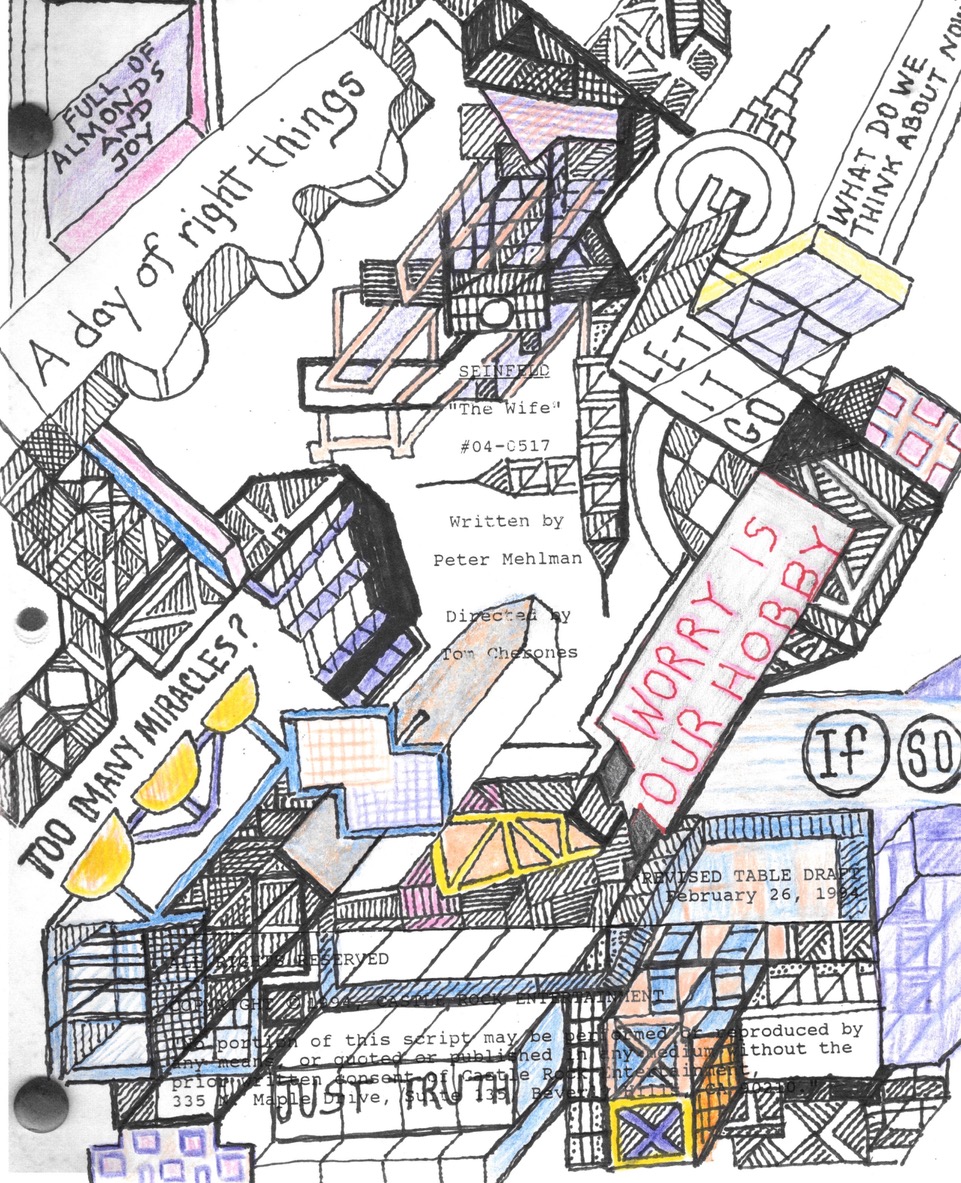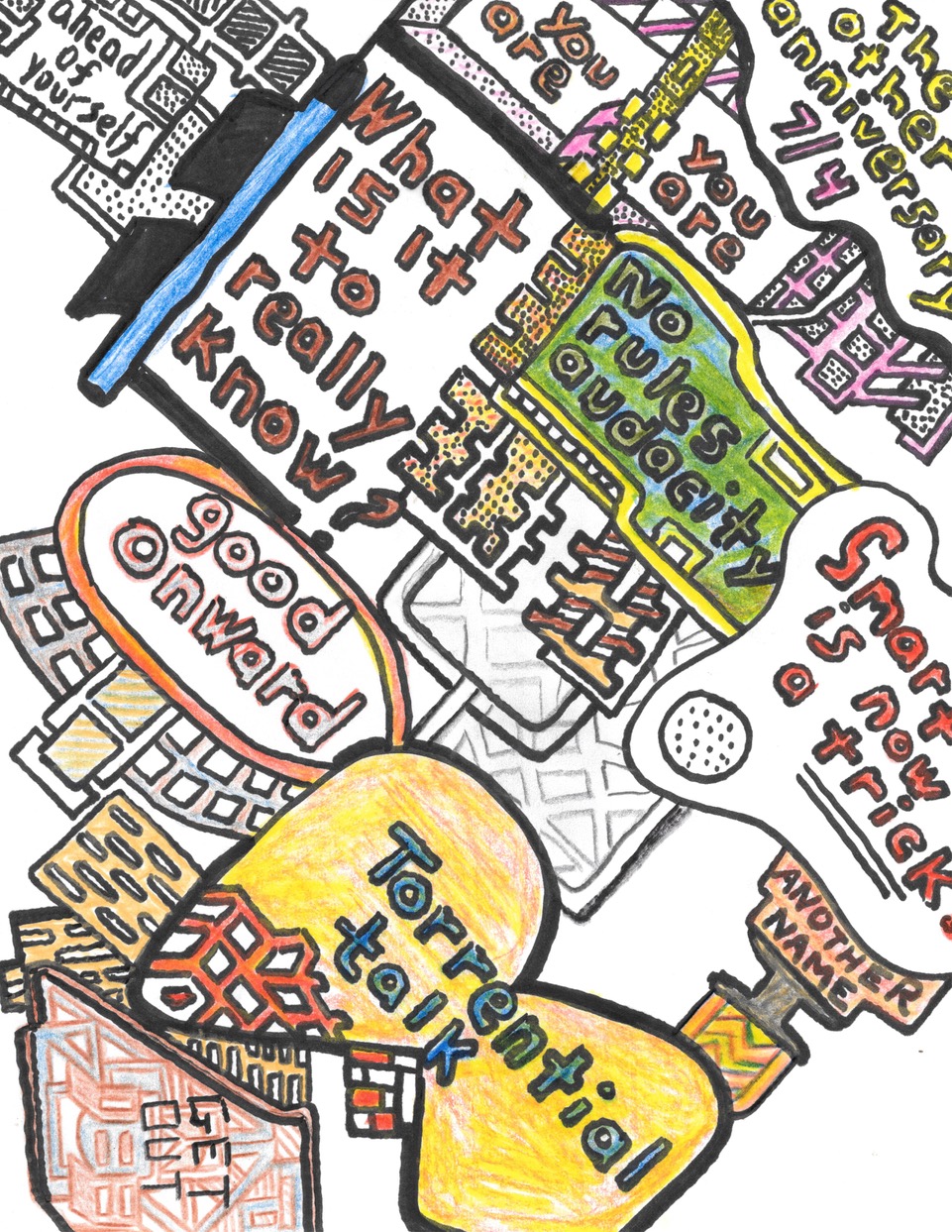AllSwell Creative Founder Laura Rubin and Seinfeld writer Peter Mehlman discuss the current state of comedy, doodling your way toward creativity, and how to charm a meter maid.
Chances are, Peter Mehlman has made you laugh. During his tenure as a senior writer on Seinfeld, Mehlman’s work gave us cultural vocabulary including “Yada Yada,” “spongeworthy,” “shrinkage” and “double-dipping.” From his early years as a copywriter for Howard Cosell to being on staff at Esquire, contributing Op-Ed stories to The New York Times and more recently publishing a novel, this is a writer who cannot (will not) pick a creative lane.In advance of All Swell’s real-time event “Now, That’s Funny” (part comedy-writing workshop, part “Storytellers” conversation) on December 8 in Los Angeles, I talked with Peter about putting trust in your subconscious, the steep and horrifying devolution of stand up after Richard Pryor and legislating creativity.
Keep up with Laura Rubin @allswellcreative

Doodles by Peter Mehlman from “Bravely Oblivious”
Laura Rubin: You’ve mentioned that Seinfeld made you obsessed with creativity. In what ways?
Peter Mehlman: Before Seinfeld I was a journalist, a field that requires you to be an observer, to report on what you see and ask questions about what you don’t understand or need to clarify. When I started at Seinfeld it was clear that so many of Larry David’s great ideas sprung from his own thoughts. He had incredible access to his inner fixations and life priorities. So, while it was helpful to also be observant about the outside world, I had to learn to have a safety net to catch my own thoughts. That’s where the real creative part of writing for the show started. You had to take your ideas and MAKE UP what happens next. Fiction as opposed to writing facts. You kind of get consumed with the question, “What if?” Then you struggle to find creative paths for stories.
Coaxing creativity out of myself did consume me, especially since I’d never considered myself creative. But you realize that, in a way, you can force creativity, or legislate it. Just say to yourself: Is your next step in the story surprising or interesting? And if not, you just start objectively coming up with other options. It reached a point where I decided anyone can be creative if forced to be. You don’t have to worry about whether it comes naturally.
LR: “Legislating creativity” sounds like a reasonable approach. Doodling is part of your creative process. How do your drawings and what you write speak to each other?
PM: Depending on how absorbed I am with whatever I’m writing, my thoughts go on their own to the current project. If I suddenly realize I haven’t heard a word of what’s been on TV for the last hour, there’s a good chance I’ve been writing in my head while doodling. Often the doodles will have some relevance to the writing, almost like taking notes.
Doodling with the TV on or taking a shower are great ways of letting my mind run free. Something about the noise helps me focus. On the other hand, a doodle can also inspire a new thought about the writing.
I think the key thing here is, you’re not doodling as a mission. You shouldn’t say, “I’m going to doodle now so I come up with something creative for my writing.” You put a little trust in your subconscious that maybe you’ll get lucky. And, as is the case with EVERYTHING, you do anything to try getting lucky.

LR: You’re launching a line of products that are printed with your epic doodle art called “Bravely Oblivious,” which sounds like a description of me in my 20s. What does Bravely Oblivious mean?
PM: No idea. It stems from a doodle from who-knows-when. It probably arose from something I heard while not watching TV, just listening. Although it could have come from a random thought about someone in real life. The doodles and their phrases are purposefully unconscious … it’s like letting your mind just go. Sometimes the thoughts make sense years later, sometimes they don’t make sense in the moment.
LR: I’ve said that mean-funny is the easiest and lowest form of comedy. Agree? And what do you consider to be the highest form of comedy?
PM: Mean funny is pretty far down there but trying-to-shock humor—especially when it relies on saying naughty words—bugs me more than anything. Joan Rivers did mean-funny and was pretty hysterical. The fact is, any kind of funny can be great if in the right hands. Unfortunately, there are just so many right hands. Pryor, Sarah Silverman, Woody Allen, to name a few.
Then there are a million second-handers who try to do the same thing but completely miss the point of why the originals were so great. The devolution of comedy inspired by Pryor is especially steep and horrifying. Comics in every club across America using his language without any of his depth, power or feeling.

LR: God bless Joan Rivers. Indulge me: What’s the funniest thing that happened to you in 2018?
PM: I got an invitation to a wedding party and couldn’t place the couple. They didn’t give last names and I just had no idea who “Diane and Alex” were. After a week of wracking my brain, I finally remembered who Diane was. (“Oh right! I heard she was engaged! So nice of her to think of me. She’s really brilliant. I didn’t think we were that close but still…”)
I RSVP’ed that I’d come to the party. I bought an engagement gift. I drove to a home in Venice where there were no parking spots anywhere and wound up taking a chance on an illegal spot.
Walking up to the backyard party, a guy approached me and said, “You looking for Alex and Diane?” I said, “Yes, well, mainly Diane.” He said, “Oh there she is.”
I looked. I’d never seen this woman in my life. I introduce myself and she says, “Alex will be thrilled you came!” Alex ran over. I recognized him. Barely. I’d met him a few times through someone I couldn’t remember. He was a struggling writer who I vaguely remembered as being a nice guy but that was it.
He got me a drink, took the gift and, in his little toast, singled me out for giving him “the honor of his presence” at this special occasion. I finally told him I was illegally parked and he said, “Go! I’m just really touched you came.”
I got to my car at the same time as a meter maid. Instead of begging, I just said, “Before you write the ticket, I have the funniest story to tell you.” She said, “I could use a funny story. My husband just cheated on me.” I told her the story, she laughed so much that she voided the ticket as some kind of mistake on her part.
I just said, ‘Before you write the ticket, I have the funniest story to tell you.’
LR: Let the record show: Peter Mehlman can even charm a cheated-on meter maid. You went from being a journalist to writing for TV to being a novelist. That’s breadth. How does the medium you’re writing for change your experience of writing?
PM: I always write with the next reader in the back of my mind. In a weird way, the biggest difference stems from who is or isn’t looking over my shoulder when I write (literally or figuratively). Editors in journalism are usually dedicated people with integrity. That’s how you get to be an editor. I have outsized respect for them, so I’m ultra-careful with accuracy, grammar and economy of words. In TV, if I’m writing with Larry David and Jerry Seinfeld in mind, the same holds true.
However, if my TV reader is some network executive I find myself engaged in more deception than I’d like, making them believe I’m giving them what they want while sneakily writing what I want. The game of that is less enjoyable. It’s not that I don’t have respect for executives…well, actually, that’s exactly what it is. Sorry.
Novel writing is the best situation for me. That’s partly because I’ve been lucky enough to make the kind of money that allows me to spend a lot of time writing something that may not earn me a dime, or even get published. But if I’m enjoying the writing, that’s all that matters. And it gives me the power to choose who I’d like to imagine as my reader. That’s incredibly liberating.

LR: Liberating, yes. Choosing your reader might be the writer’s greatest luxury. There are now more outlets for creative output than ever before. Thoughts on the current state of comedy? Any up-and-coming shows / programs / podcasts / talent that you’re particularly enjoying?
PM: Maybe I’m out of touch, but it feels like comedy has fallen behind the other genres. On TV all the great work is in sci-fi and drama. The comedies that win Emmys are full of heartwarming episodes. You make people cry and win an Emmy for comedy? Really?
In movies, there is no one who’s taken the baton from The Zucker Brothers or Mel Brooks or Woody. I can’t remember the last great comedy: Groundhog Day? Four Weddings? The whole gross-out, “Hangover” genre … it all seems so easy.
Romantic comedies are especially dead. When I walked out of the ballyhooed “Crazy Rich Asians” I felt like I must have the lamest sense of humor in the world. Funny? Eh. Cliched? Wildly. Full of lame stereotypes? Overfilled. Ridiculously convenient plot points? I stopped counting 20 minutes in.
That feeling of being out of step with current comedy is partially why I started doing stand-up, just to see if my idea of funny translates at all anymore. It’s been a blast. I love it.
I don’t really watch other comedians. No idea why. Although I’ve seen Jarrod Carmichael a few times. He’s amazing.
LR: When can we catch your next stand-up show?
PM: I never really know when my shows will be. Sorry. I haven’t bought into the “you have to go up at least three times a week” theory. Which is another thing I love about stand-up: doing well while breaking all the cliched rules.










